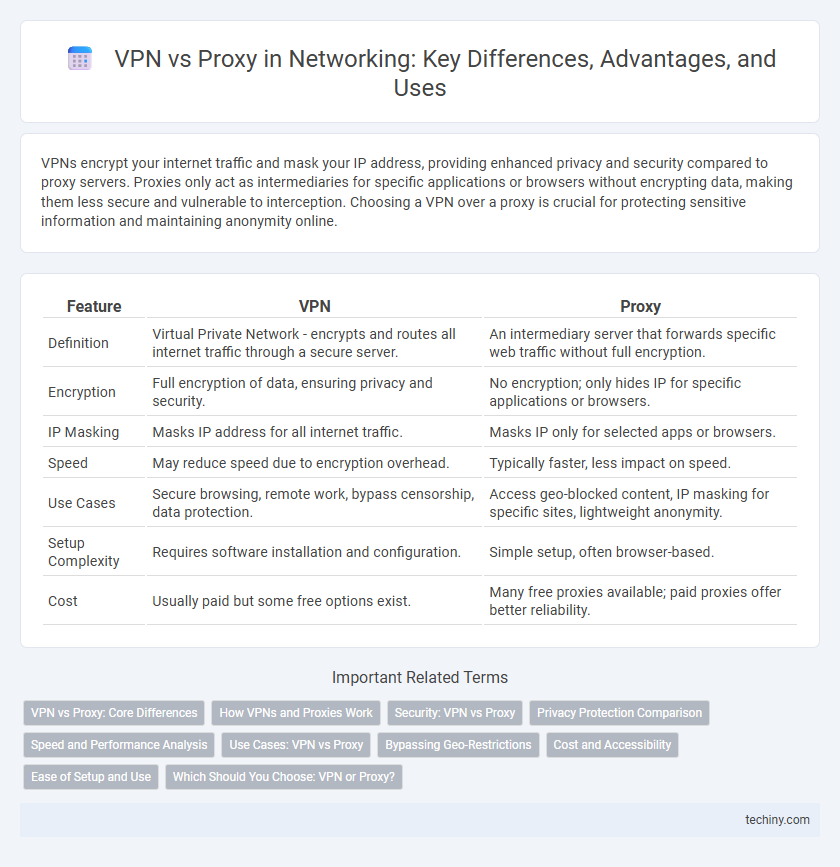VPNs encrypt your internet traffic and mask your IP address, providing enhanced privacy and security compared to proxy servers. Proxies only act as intermediaries for specific applications or browsers without encrypting data, making them less secure and vulnerable to interception. Choosing a VPN over a proxy is crucial for protecting sensitive information and maintaining anonymity online.
Table of Comparison
| Feature | VPN | Proxy |
|---|---|---|
| Definition | Virtual Private Network - encrypts and routes all internet traffic through a secure server. | An intermediary server that forwards specific web traffic without full encryption. |
| Encryption | Full encryption of data, ensuring privacy and security. | No encryption; only hides IP for specific applications or browsers. |
| IP Masking | Masks IP address for all internet traffic. | Masks IP only for selected apps or browsers. |
| Speed | May reduce speed due to encryption overhead. | Typically faster, less impact on speed. |
| Use Cases | Secure browsing, remote work, bypass censorship, data protection. | Access geo-blocked content, IP masking for specific sites, lightweight anonymity. |
| Setup Complexity | Requires software installation and configuration. | Simple setup, often browser-based. |
| Cost | Usually paid but some free options exist. | Many free proxies available; paid proxies offer better reliability. |
VPN vs Proxy: Core Differences
VPNs encrypt all internet traffic and route it through secure servers, providing comprehensive privacy and security by masking IP addresses and protecting data from interception. Proxies only reroute traffic from specific applications or browsers without encryption, offering limited anonymity and no protection against data breaches. Unlike proxies, VPNs ensure full device coverage, making them essential for secure remote access and safeguarding sensitive information on public networks.
How VPNs and Proxies Work
VPNs create a secure, encrypted tunnel between your device and the internet, masking your IP address and ensuring data privacy by routing traffic through remote servers. Proxies act as intermediaries that forward requests between your device and the target server, often altering your IP address but without strong encryption. While VPNs provide comprehensive security and anonymity, proxies primarily focus on IP masking and may not protect data from interception.
Security: VPN vs Proxy
VPNs provide end-to-end encryption and mask the entire IP address, creating a secure tunnel that protects all internet traffic from interception and surveillance. Proxies only route specific application traffic without encrypting data, leaving user information vulnerable to hackers and ISPs. For robust security, VPNs offer comprehensive protection against cyber threats and data breaches, unlike proxies that serve primarily for content access and anonymity.
Privacy Protection Comparison
VPNs encrypt all internet traffic, providing comprehensive privacy protection by masking IP addresses and preventing data interception across networks. Proxies only reroute specific application traffic without encryption, resulting in limited privacy and vulnerability to monitoring or data leaks. For enhanced anonymity and secure browsing, VPNs offer superior protection against surveillance and cyber threats compared to proxies.
Speed and Performance Analysis
VPNs encrypt all internet traffic, which can introduce latency and reduce browsing speed due to the overhead of encryption and server distance. Proxies typically handle only specific application traffic and do not encrypt data, resulting in faster response times but less security. Performance depends on server load, location, and protocol efficiency, with proxies often favored for speed in non-sensitive tasks and VPNs for secure connections despite potential speed trade-offs.
Use Cases: VPN vs Proxy
VPNs provide comprehensive encryption and secure remote access to entire networks, making them ideal for protecting sensitive data during public Wi-Fi use or accessing geo-restricted content safely. Proxies primarily handle web traffic, enabling users to bypass content filters or maintain anonymity while browsing but do not encrypt traffic, limiting their security scope. Organizations rely on VPNs for full network security and remote workforce connectivity, while proxies serve well in lightweight tasks like managing web requests and hiding IP addresses.
Bypassing Geo-Restrictions
VPNs encrypt internet traffic and route it through servers in different countries, effectively masking the user's IP address to bypass geo-restrictions on streaming platforms and websites. Proxies act as intermediaries for requests and can change the IP address but often lack strong encryption, making them less reliable for accessing region-locked content securely. VPNs provide more consistent and secure access to geo-restricted services due to stronger privacy protocols and broader server networks.
Cost and Accessibility
VPN services generally involve higher costs due to encryption technology and dedicated servers, while proxies often offer free or low-cost options with limited security. VPNs provide broader accessibility by supporting multiple devices and platforms with consistent privacy features, whereas proxies mainly handle specific application traffic with fewer compatibility options. Choosing between VPN and proxy hinges on balancing budget constraints against required security and device support.
Ease of Setup and Use
VPNs typically offer easier setup with user-friendly applications that configure connections automatically across multiple devices, ensuring seamless security. Proxies require manual configuration per application or browser, often demanding technical knowledge and frequent adjustments. VPNs provide consistent encryption and privacy by routing all traffic, while proxies only mask IP addresses for specific apps, making VPNs more straightforward and reliable for general users.
Which Should You Choose: VPN or Proxy?
Choosing between a VPN and a proxy depends on your security needs and online activities. VPNs encrypt all your internet traffic, providing comprehensive privacy and protection against hackers and ISP monitoring, making them ideal for secure browsing and streaming. Proxies, however, only reroute specific application traffic without encryption, suitable for basic geo-unblocking but not for safeguarding sensitive data or maintaining anonymity.
VPN vs Proxy Infographic

 techiny.com
techiny.com